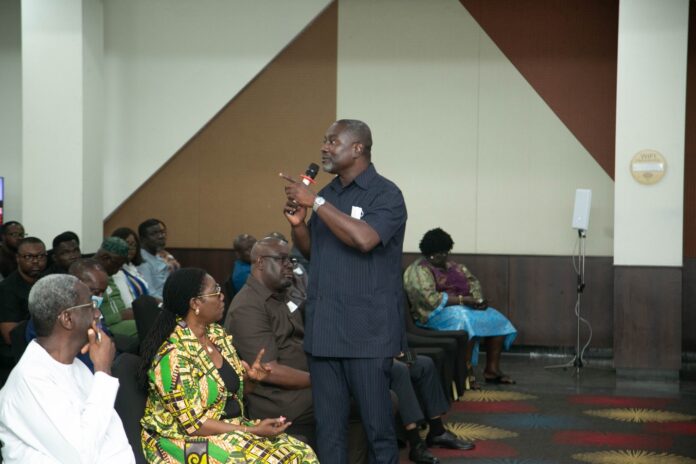
Government has invested over US$500million in its effort to digitalise the economy, Director General of the National Information Technology Agency (NITA), Richard Okyere-Fosu, has stated.
According to Mr. Okyere-Fosu, most of the investments were to provide the needed infrastructure and enabling environment to ensure the basic and needed framework that allows other sectors within the public sector to also digitalise or automate the delivery of their mandates.
Mr. Okyere-Fosu made the disclosure at a recent two-day Technology Breakfast Meeting organised by NITA in collaboration with the State Interests and Governance Authority (SIGA) and Office of the Head of Civil Service (OHCS).
The meeting brought together key stakeholders and decision-makers in the Digital Ghana Agenda, with the objective of exposing them to the highlights of Ghana’s digitalisation agenda and also get them to appreciate their layer of the digitalisation framework and the role they play in its realisation; re-introduce the Smart Workplace TM (Government Virtual Office) to the executives, and adoption-strategies to ensure their institutions are on-boarded and utilising the smart workplace; and the cessation of using private emails for government business.
“As public sector executives, it is important for us to know and align with what government has already done, what government is doing and what government plans to do in the area of digitalisation. This will ensure that we avoid duplication of resources and efforts, but rather consolidate and optimise our initiatives within the technology space, and deploy interoperable technologies which can communicate with existing and future systems,” Mr. Okyere-Fosu said.
He, therefore, urged public sector executives to lead the adoption of Information Communication Technology (ICT) in their various institutions to promote transparency, accountability, efficiency and improved productivity.
“Furthermore, we will have to provide the needed leadership by leading the change management process in efforts to digitalise the public sector,” he added.
The infrastructural investments
Providing highlights of the infrastructural investments, Mr. Okyere-Fosu said government invested in building two state-of-the-art Data Centres in Accra and Kumasi to provide Data Centre services to government agencies and the private sector.
The infrastructure was to relieve government agencies of huge investment needed in building their own data centres, but also provide capacity to host their services
Government also deployed a government-private cloud infrastructure at the two data centres that provides cloud services: such as Infrastructure as a Service (IaaS), Platform as a Service (PaaS), Application as a Service (AaaS), Security as a Service (SaaS) among other IT services – just like Amazon, Azure and the like.
“This allows government agencies to avoid investing directly in the purchase of IT infrastructure like servers, storage, firewalls and the like, but have it as a service and only pay for capacities they utilise in a more cost-effective approach. Effectively, you pay for OPEX as opposed to CAPEX,” he stated.
Connectivity
On connectivity, Mr. Okyere-Fosu said NITA – through the eTransform Project under the Ministry of Communications and Digitalisation of government – just completed a procurement process to provide connectivity to government agencies for a ten-year period.
“The project will connect district assemblies, hospitals, police stations, post offices and other government agencies around the country. This will provide stable and reliable connectivity to government agencies,” he stated.
Public Key Infrastructure (PKI) and Security Operations Centre (SOC)
Again, Mr. Okyere-Fosu spoke on the establishment of Public Key Infrastructure (PKI) and a Security Operations Centre (SOC).
The PKI is a security solution that helps NITA to encrypt government data in storage or in transit. “This help protect government data. The PKI also provides us with services such as digital signatures, securing of websites, and preventing fake government-issued documents such as permits, certificates, cards, visas, passports etc. This is available for all government agencies’ use, so kindly contact us for more information on this,” he stated.
The SOC, on the other hand, is a proactive security operations centre that monitors government’s critical installations in a more proactive manner in order to prevent malicious attacks. “This platform is able to learn and report the activities of hackers even before they are successful, and provide you with tools to prevent breaches. This platform can be integrated in the environment of agencies which run critical IT systems,” he stated.









